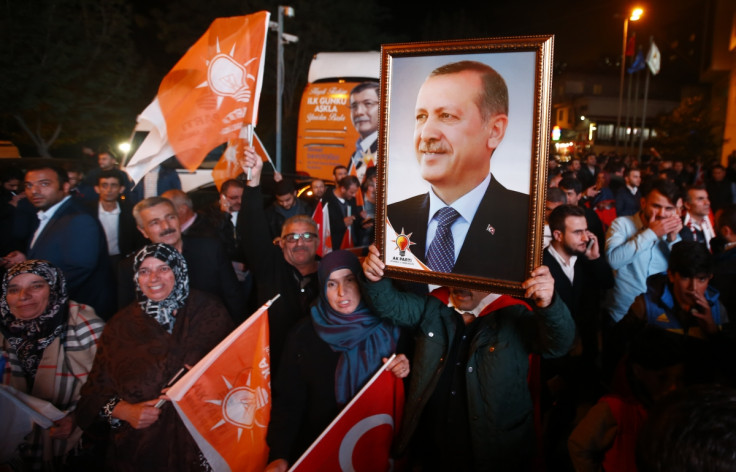Turkey: Results defy poll predictions as President Erdogan's AK Party returns to single party rule

Turkey's AK Party has returned the country to single-party rule following elections on Sunday with President Recep Tayyip Erdogan set to push for more executive powers for the president's office. With more than 99% of the votes counted, AKP secured 49% of the votes, giving it a clear majority of parliamentary seats.
The victory falls short of the 330 parliament seats that would have given the party the power to call for a referendum to approve constitutional changes to create an executive presidency along the lines of the US or France, but analysts say that Erdogan remains the most powerful Turkish leader in the country's recent past.
Erdogan took over Turkey's presidency last year after serving three terms as prime minister. He became Turkey's first elected president and had hoped to transform his new position from a largely ceremonial one to a strong executive post.
Under Turkey's current constitution, Erdogan has to remain independent but he has argued that the country's current challenges require a strong government rather than a coalition and has openly campaigned for a constitutional change to give the president's office more powers.
Following the victory, Erdogan issued a statement saying: "The election results show that our nation has sided with looking after the environment of stability and trust that was risked on June 7," referring to the election during which AKP lost its overall majority that it had enjoyed since 2002
Erdogan had said that the elections on Sunday was a chance for the Turkish people to restore stability at a time of tension over Kurdish insurrection.
"Turkey lost considerable ground in economy, politics and terror during this period, and gains were lost. Voters appeared to want to bring back stability once again," an AKP official told Reuters.
The results show that the AKP has secured 49.4% of the total votes counted so far, with the centre-left Republican People's Party or the CHP securing 25.4% and the far-right Nationalist Action Party or MHP with 11.9% of the votes. The pro-Kurdish left-wing Peoples' Democratic Party (HDP) managed only 10.7%.
AKP leader and Turkey's Prime Minister, Ahmet Davutoglu briefly addressed crowds of cheering supporters. "Today is a victory for democracy and our people ... Hopefully we will serve you well for the next four years and stand in front of you once again in 2019," he said. Later, at the AKP headquarters in Ankara, he urged Turkey's political parties to work together on a new constitution, cementing Erdogan's push for a more powerful president.
Reaction to AKP's win
Mustafa Akyol, a Turkish analyst and columnist described the AKP's win as a major and unexpected victory. "The escalating terrorist attacks and decline of the economy since July created fear about political instability. Those who seek stability voted for the AK Party, fearing that the coalition governments are bad for Turkey as it was in 1990s," Akyol told Al Jazeera.
A senior official from opposition party CHP said the results was "simply a disaster." There are concerns that the election results would put Turkey on a course that would only serve to further worsen the split between pious conservatives who champion Erdogan as a hero of the working class and the Western-facing secularists who are more cautious about his leadership style and Islamist ideals.
Bruce Riedel, a former CIA analyst and sometime policy advisor to US President Barack Obama told Reuters: "This makes more difficult a strategy of using the Kurds against IS because AKP appeals to anti-Kurd sentiment. Erdogan and his party have been fierce critics of the US support for Kurdish militia fighters battling Isis across Turkey's border in Syria.
The lira firmed to its strongest in two and a half months following the results, despite the fact that investors had more or less been expecting a coalition in power. The prospect of a strong and stable government, even the AKP, appeared to offer relief to the market after the months of uncertainty that had plagued the country.
© Copyright IBTimes 2025. All rights reserved.






















